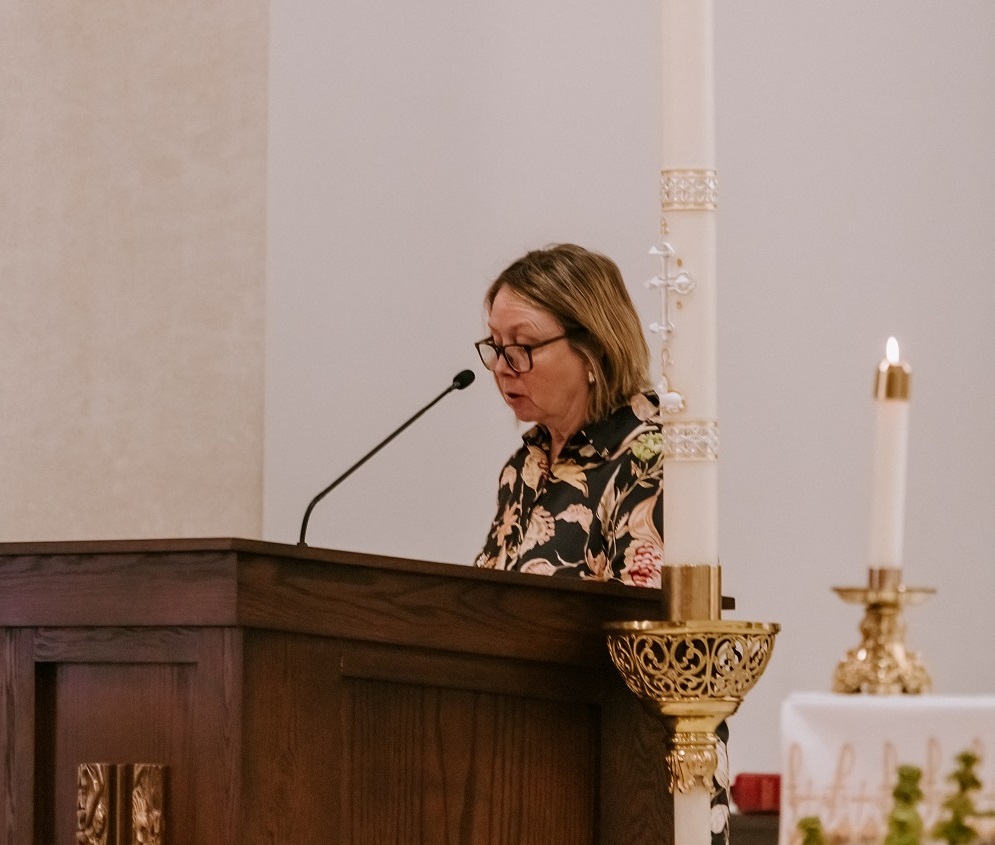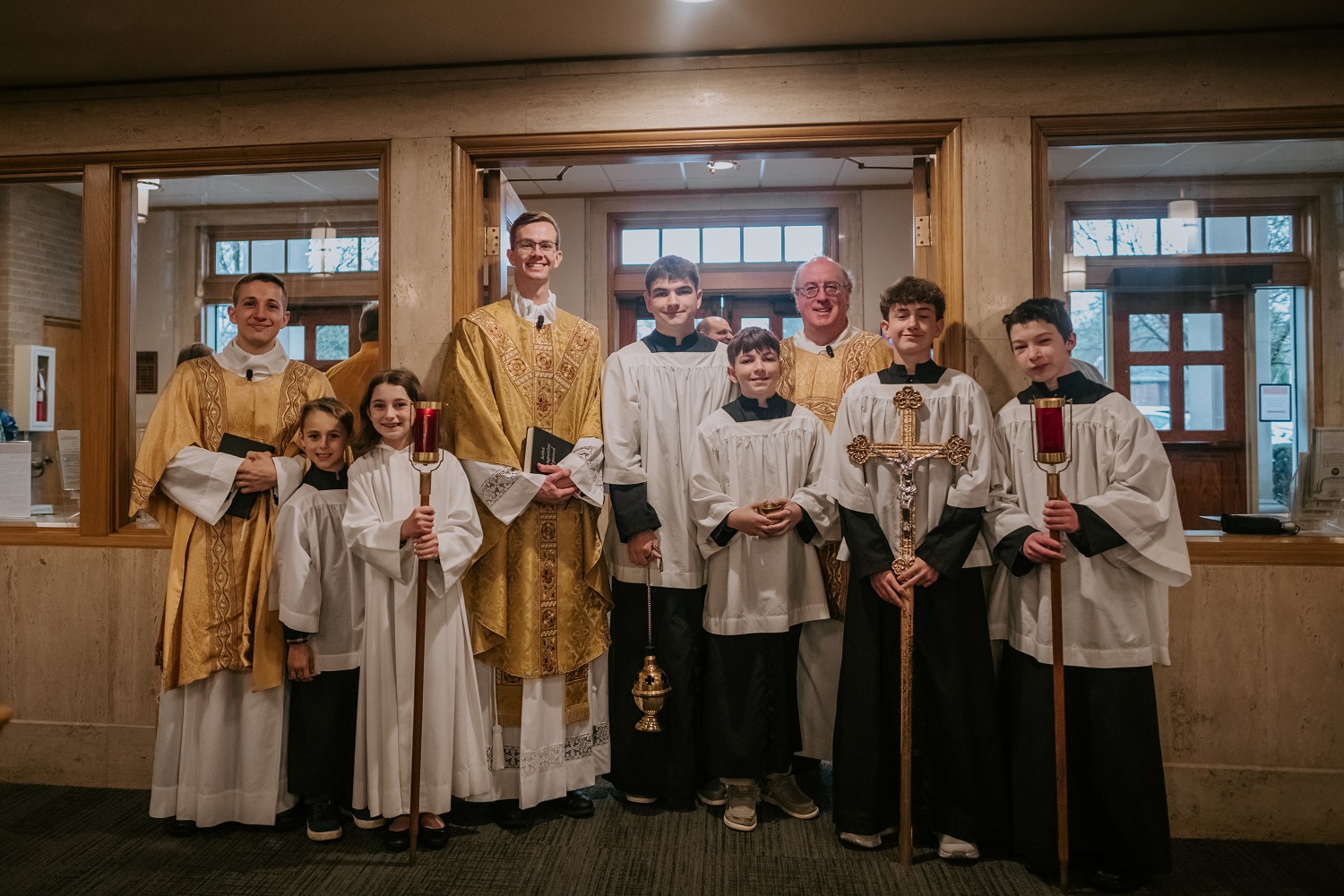Liturgy
Liturgical Ministers are a very important part of each Mass held at St. Philomena. Areas in Liturgical Ministry are: Lectors, Eucharistic Ministers, Ushers, Choir and Altar Servers. If you are interested in serving the Church in this way, please email parish@stphils.com or fill out the Stewardship Form on the bottom of this page and we will be happy to speak with you in more detail.
Scheduling
Schedules are set in three-month blocks: February-April, May-July, August-October and November-January. We utilize the online system, Ministry Scheduler Pro, for Lectors, Eucharistic Ministers and Altar Servers.
Lector
Lectors assist the priest by proclaiming the sacred scripture to the faithful during Mass.

Role
The reader or lector reads from the ambo the readings that precede the Gospel. In the absence of a psalmist, the reader may also proclaim the Responsorial Psalm after the First Reading.
The lector, after the introduction by the Priest, may announce the intentions of the Universal Prayer from the ambo.
If there is no singing at the Entrance or at Communion and the antiphons given in the Missal are not recited by the faithful, the reader may read them at an appropriate time (cf. nos. 48, 87). (GIRM, nos. 196-198)
The lector should prepare for each Mass when scheduled by reviewing the readings ahead of Mass to become familiar with the reading and be aware of words or locations that may be difficult to pronounce. Pronunciation assistance can be found in audio versions of each day’s readings on the United States Conference of Catholic Bishops website: http://www.usccb.org/bible/readings-audio.cfm
The scheduled lector, Eucharistic Ministers and altar servers are asked to meet in the sacristy 5-10 minutes prior to the start of Mass for prayer.
Eucharistic Minister
Extraordinary Minister of Holy Communion (EMHC) or commonly called Eucharistic Ministers, are lay people who assist the priest through distribution of Holy Communion at Mass.

Role
In every celebration of the Eucharist, there should be a sufficient number of ministers of Holy Communion so that it may be distributed in a reverent and orderly manner. Bishops, priests and deacons distribute Holy Communion in virtue of their office as ordinary ministers of the Body and Blood of the Lord. (1) If such ordinary ministers of Holy Communion are not present, “the priest may call upon extraordinary ministers to assist him, i.e., duly instituted acolytes or even other faithful who have been deputed for this purpose. (GIRM 162).”
Each EMHC should be fully initiated (Baptism, Confirmation, and Eucharist), a practicing Catholic, and good role model for the congregation. Besides being well trained in the rites of distributing Holy Communion within Mass and bringing Communion to the sick or homebound, the spiritual formation of Communion
ministers is most important. An EMHC must be commissioned by the Diocese of Peoria for service to a specific parish for a period of three years. Signed affidavits are required from the individuals testifying that they have been trained according to diocesan norms. These are submitted to the Bishop’s Office before the EMHC is commissioned. (From The Ministry of an Extraordinary Minister Of Holy Communion In the Diocese of Peoria, 2012)
The scheduled lector, Eucharistic Ministers and altar servers are asked to meet in the sacristy 5-10 minutes prior to the start of Mass for prayer.
Homebound Minister
Homebound Ministers are Extraordinary Ministers of Holy Communion (EMHC)/Eucharistic Ministers who assist the priest by visiting our homebound parishioners, praying with them and taking Holy Communion to them.
Role
Besides the usual duties of distributing Holy Communion at Mass, EMHC’s are asked to be especially generous in assisting priests in the ministry to the sick. While many of us live very busy lives, every EMHC should seriously consider volunteering to bring Communion to the sick, homebound, and nursing home parishioners regularly, at least once a month. Not only does this type of ministry provide invaluable service to the priests, but can be great aid in fostering one’s own prayer and Eucharistic devotion. (From The Ministry of an Extraordinary Minister Of Holy Communion In the Diocese of Peoria, 2012)
Altar Server
Altar Servers assist the priest during Mass including daily, Sunday, weddings, funerals, and other special occasions. Servers are trained in 5th grade. Students in Sunday Faith Formation or junior high who are interested in being trained should speak with their Faith Formation teacher.

Role
Since the role of server is integral to the normal celebration of the Mass, at least one server should assist the priest. On Sundays and other more important occasions, two or more servers should be employed to carry out the various functions normally entrusted to these ministers. (Guidelines for Altar Servers, United States Conference of Catholic Bishops)
Servers carry the cross, the processional candles, hold the book for the priest celebrant when he is not at the altar, carry the incense and censer, present the bread, wine, and water to the priest during the preparation of the gifts or assist him when he receives the gifts from the people, wash the hands of the priest, assist the priest celebrant and deacon as necessary. (Guidelines for Altar Servers, United States Conference of Catholic Bishops)
The scheduled lector, Eucharistic Ministers and altar servers are asked to meet in the sacristy 5-10 minutes prior to the start of Mass for prayer.
Usher
Ushers can be men or women of our parish who help with non-Liturgical, but still important, tasks during a Mass or special service.
Role
Ushers are asked to greet people at the main entrance of the church prior to each Sunday Mass. This is an important act of welcoming and also makes ushers available to people who might have questions. In the case of holidays where attendance can be extraordinary, ushers may be called upon to help people find seats in the church. Ideally, the faithful should not stand in a vestibule or walkway during Mass when seats are available. Ushers take up the collection during the offertory and then secure the collection. At the conclusion of Mass, as people have left the worship area, ushers can make sure that the pews are in order and books and bulletins returned to their holders. Ushers are also called upon to take up a collection during Holy Day of Obligation Masses.
While ushers are not on a set schedule like lectors, Eucharistic Ministers or altar servers, it is preferred that they be identified in the parish office. This is to help with communication to ushers when there are special occasions or special collections and their assistance is needed. It is beneficial to have many lay people identified as ushers to allow flexibility in Mass attendance.
Ministry Scheduler Pro
Schedules are set in three-month blocks: February-April, May-July, August-October and November-January. Existing Liturgical Ministers can log in to Ministry Scheduler Pro (MSP) by clicking on the logo below for the most up-to-date scheduling needs.
MSP also has an app for both iOS and Android operating systems. Go to the App Store or Play Store on your device, search for Ministry Scheduler Pro and install the app. Open the app and enter the following under Organization ID: stphilspeoria . Enter the same username and password you use for the Web Terminal (desktop) to log in.

